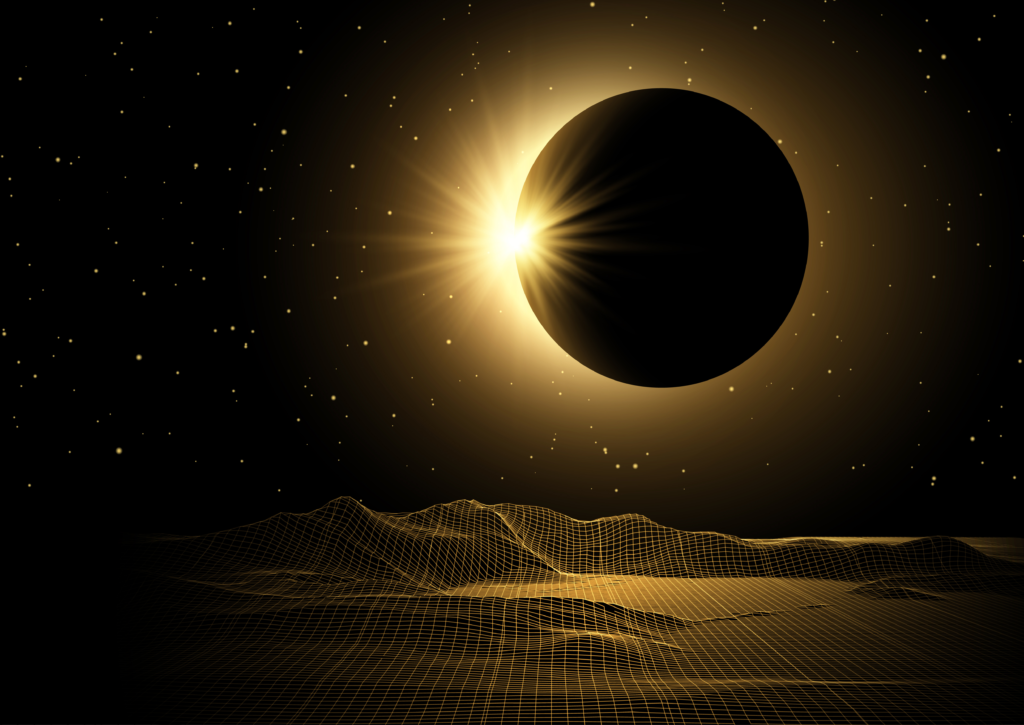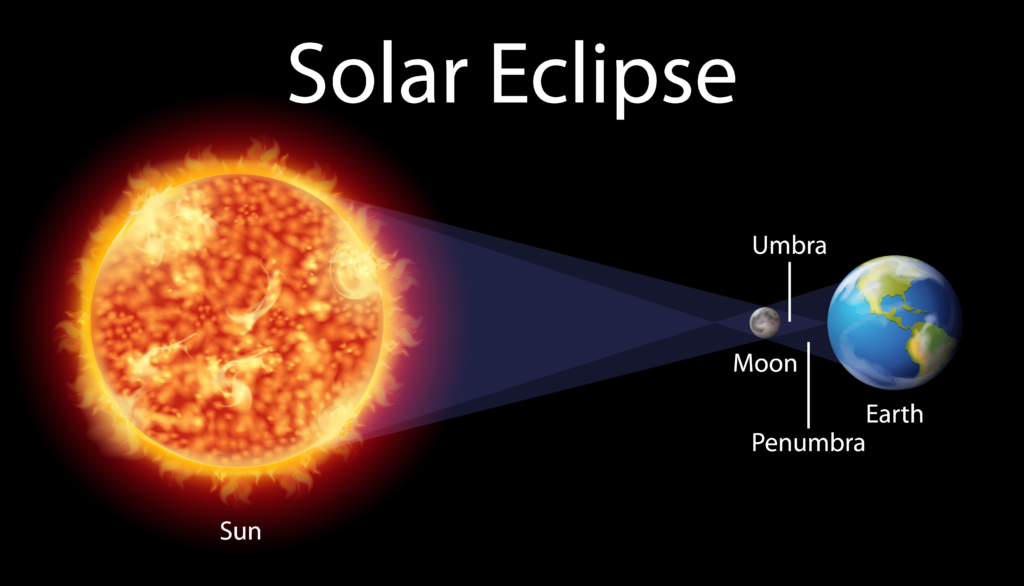Confused about whether you should travel during solar eclipse or not? What all protections you should take? What all concerns may arise? In this article we have covered the mythological, scientific, astrological and practical perspectives about whether you should travel during solar eclipse or not from a 3600 angle. Read the full article to have a complete understanding on the pros and cons of travelling during a solar eclipse.

Should I Travel During Solar Eclipse?
Off course you can. Generally it is safe to travel during solar eclipse, provided certain precautions are taken. The safety measures include not gazing directly at the sun during a partial solar eclipse or wearing a protective sunglass when travelling by road.
However, if you opt for air travel during a solar eclipse, you should be mindful of the possibility of turbulence induced by wind shear as a result of the sun’s light being blocked by the moon.
Travelling by boat should also be approached with caution, as rough seas may make your trip more challenging.
What is a Solar Eclipse?

A solar eclipse happens when the moon comes in between the Sun and the Earth, temporarily covering the sun’s light. This casts a shadow of the Moon on Earth, dimming the sun’s rays. Solar eclipses are classified as total, partial, or annular based on the amount of the sun’s portion that moon covers.
What is a Total Solar Eclipse?
A total solar eclipse happens when the moon fully obscures the sun and cast a brief shadow across the Earth. The whole visible disc of the sun is hidden during this unusual event, exposing the corona, the sun’s outer atmosphere. Total solar eclipses are Amazing cosmic events that occur in specific places when the moon exactly aligns with the Sun and the Earth.

What is a Partial Solar Eclipse?
A partial solar eclipse occurs when the moon partially covers the sun, creating a heavenly spectacle where the sun appears as a crescent. This happens when the alignment of the sun, moon, and earth isn’t perfectly in line. Viewers in certain areas witness only part of the sun being obscured during a partial solar eclipse.
What is an Annular Solar Eclipse?
An annular solar eclipse takes place when the moon covers the central portion of the sun, leaving a ring-like or “annulus” of the sun’s outer edge visible. This occurs when the moon is at a greater distance from Earth, making it appear smaller and not completely blocking the sun, creating the distinct ring effect.
How many Solar Eclipse happens every Year?
On an average, there are between 2 to 5 solar eclipses each year. These include total, partial, and annular eclipses. However, not all of them are visible from every location on Earth. The frequency and visibility of solar eclipses can vary from year to year.
Eclipse Calendar for the Year 2024 and 2025
- On March 25, 2024, a penumbral lunar eclipse will occur. This eclipse will be visible from parts of Asia, Australia, Africa, Europe, and South America.
- On April 8, 2024, a total solar eclipse will cross North America, passing over Mexico, United States, and Canada.
- On March 13–14, 2025, a total lunar eclipse will occur. This eclipse will be visible from parts of North and South America, Europe, Africa, Asia, and Australia.
- On March 29, 2025, a partial solar eclipse will be visible from parts of Asia, Africa, Europe, and Australia.
- On September 7–8, 2025, another total lunar eclipse will occur. This eclipse will be visible from parts of North and South America, Europe, Africa, Asia, and Australia.
- On September 21, 2025, another partial solar eclipse will be visible from parts of Europe, Africa, Asia, and Australia.
Different Perspectives on Travelling During Eclipse
Since childhood all of us are taught to be extra cautious during eclipses and maintain few rules. For example, don’t eat anything till the eclipse is over, don’t go outside or look at the sun during solar eclipses etc. etc. Are these just myths or superstations or do they have any scientific or logical rational behind them? Let’s understand from three different perspectives.
Travel During Solar Eclipse – Mythological Perspectives
Since childhood we have been listening about all sorts of stories and prohibitions regarding eclipses. We follow few of them and ignore few. Our mythological scriptures and cultures always advice us to stay indoors during any eclipses. However, if it is absolutely necessary to travel during solar eclipse, in that case it also provides crucial advices about travel regulations prior to any eclipse.
Scriptures say, that nobody should go outside while there is an eclipse. Furthermore, someone should postpone any long-distance travel arrangements they may have. As per astrology, solar eclipses are considered as potent energies which can have a verify of effects and influences on our lives.
However, during eclipse if you need to leave the house for any crucial reason, then always cover your head with something and be sure to return home as soon as possible. If you travel during eclipse, then make sure not to directly look at the sun while outside and carry a mirror for looking above in case you need to look up.
Travel During Solar Eclipse – Scientific Perspectives
Going out is somewhat necessary as per Science, especially for studying different effects of eclipses. However, science also advices to take few precautions while going out during solar eclipses. Traveling during a solar eclipse can be an intriguing experience and it also offers a unique scientific perspective on various effects, like:
Solar Phenomena: Traveling to a specific location to witness a total solar eclipse allows you to witness the remarkable event firsthand. During totality, the sudden darkness and the appearance of the sun’s corona reveal insights into the Sun’s outer atmosphere that are otherwise hidden.
Atmospheric Changes: Scientists can study how the eclipse affects Earth’s atmosphere. The sudden temperature drop, altered wind patterns, and changes in ionization provide opportunities to gather data on atmospheric dynamics and their effects on weather and climate.
Animal Behavior: Researchers have observed changes in animal behavior during eclipses, offering insights into how environmental cues and circadian rhythms influence various species. This can help advance our understanding of animal biology and ecology.
Astronomical Observations: Eclipses allow for daytime observations of planets and stars that are usually drowned out by the Sun’s brightness. This provides a valuable opportunity for astronomers to study celestial objects.
Citizen Science: Travelers and locals can participate in citizen science projects, contributing to data collection and research during the eclipse, promoting public engagement in scientific endeavors.
However, if we refer NASA’s science website, it advices not to gaze at sun and use the following safely precautions while going out during a solar eclipse.
Eye Safety: Except during the short phase of a total solar eclipse, when the Moon totally hides the Sun’s bright face, looking straight at the Sun without specialized solar viewing eye protection is not safe.
Viewing any section of the bright Sun through a lens for capturing eclipse pictures or video without a special-purpose solar filter clamped over the front of the optics will result in severe eye harm.
Skin Safety: The Sun will remain quite bright even during a partial or annular eclipse, or during the partial stages of a total eclipse. You will be exposed to direct sunlight for hours if you want to witness the entire eclipse. Remember to protect your skin by using sunscreen, a hat, and protective clothes while you travel during solar eclipse.
Travel During Solar Eclipse – Practical & Astrological Perspectives
Practically speaking, when it comes to taking a decision on travelling during a solar eclipse, there is no straightforward answer; rather, it depends on your personal situation, intent, and astrological context. Here are a few points to consider:
- If you’re traveling to a place where the solar eclipse is visible, you might experience some traffic or transportation delays, as many people might flock to the same location to witness the eclipse. In addition, as per astrology, eclipses have a greater impact on unstable zodiacs like Aquarius or Scorpio. These zodiac sign travelers may experience some unforeseen incidents that can impact their travel plans.
- If you’re traveling away from the eclipse zone, you might not feel its direct effects, but you could still be influenced by its energetic aftermath. Depending on your birth chart and the astrological aspects of the eclipse, you might feel more emotional, introspective, or energized than usual, which can affect your mood and behavior during the trip.
- If you’re traveling for a specific purpose, such as work or leisure, and you can’t change the date or time of your travel, then it’s best to plan ahead and be prepared for any possible disruptions or changes. You can also use the astrological insights of the solar eclipse to align your intentions and goals with the cosmic energies and make the most of your travel experience.
Conclusion
Whether you should travel during solar eclipse or immediately after it ends is determined by a variety of factors which includes, safety protections you are taking, your personal believes, the astrological background, and your adaptability to adjust to any changes or problems that may develop during travelling.
Hope you have understood the different aspects and perspectives on travelling during eclipses from this article. Now take your own informed decisions confidently that whether you should travel during a solar eclipse or not.
FAQs
Q1. What should we not do during solar eclipse?
During a solar eclipse, avoid looking directly at the sun without proper eye protection, as this can cause severe eye damage.
Additionally, refraining from eating or drinking during an eclipse is advised in some cultures, as it is believed to be a time of potential contamination and spiritual significance. However, there is no scientific evidence to support this belief. So, its up to your choice and personal discretion.
Q2. Is it OK to drink water during solar eclipse?
Yes, it’s perfectly safe to drink water during a solar eclipse. There is no scientific basis for the belief that water or any consumables become impure or harmful during an eclipse. You should always stay hydrated, especially if you are outdoors during the event.
Q3. Should you shower after eclipse?
Showering after a solar eclipse is a personal choice and not scientifically necessary. There’s no evidence to suggest that an eclipse affects personal hygiene. However, some cultures have customs or beliefs related to purification rituals after an eclipse, but it’s not a universal practice.
Q4. Can we drink coffee during a solar eclipse?
Yes, you can drink coffee during a solar eclipse. There is no scientific reason to avoid coffee or any other beverages during an eclipse. Any restrictions related to food or drink during an eclipse are often based on cultural or religious beliefs rather than health or safety concerns.
You may also be interested in knowing:
How to Prepare Oats for Weight Loss, Muscle Gain, Babies, Pregnancy & Diabetic Patients
How to Prepare Detox Water for Good Health, Weight Loss & Clear Skin – 13 Recipes
How to Increase Hemoglobin in a Week Vegetarian – Top 10 Foods
Should I Buy Flowers on the First Date? Get Clarity with 5 Choices
What Should be the Density of Petrol? All 5 Wise Things You Need to Know
4 thoughts on “Should I Travel During Solar Eclipse? Mythological, Scientific and Practical all 3 Perspectives”